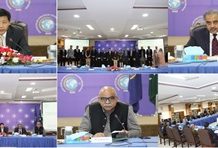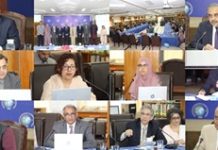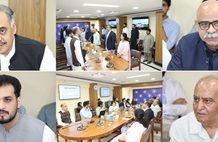The Institute of Strategic Studies, Islamabad (ISSI) hosted an In-House Meeting today on “Challenges for Pakistan’s National Security”. Lt. Gen. Waheed Arshad, former Chief of General Staff, was the guest speaker at the meeting.
Other guests at the meeting included: Ambassador Ali Sarwar Naqvi, Executive Director, Centre for International Strategic Studies; Ambassador Arif Ayub, President, Institute of Regional Studies; Ambassador Sohail Amin, President, Islamabad Policy Research Institute; and Khurram Abbas, Assistant Research Officer, Islamabad Policy Research Institute
Gen. Arshad said that in order to enhance security, Pakistan has to deal effectively with its relationship with India. In order to resolve issues of conflict, it is imperative to evolve a common framework. Divergent frameworks and offensive doctrines such as the Cold Start, would keep the region in a state of turmoil and tension. Turning to Afghanistan, he said that Pakistan should address the issues of terrorism and militancy, and eliminate safe havens and support to TTP. In addition, the State must establish its full writ in FATA. Internally, Pakistan must deal with issues of extremism and radicalization, and improve governance by promoting transparency and accountability, fostering participatory politics, redressing institutional defects, ensuring law enforcement, and creating new professional competencies. At the same time, reform of the criminal justice system must continue, and the State must continue to invest in economic and human development. In this context, priority must continue to be accorded to water and energy security.
Director General ISSI, Ambassador Masood Khan, said that the issues in governance can be addressed by consolidating democracy, building institutions, evolving checks and balances, and ensuring a public and private sector regulatory framework to serve the best interests of the people of Pakistan. He said that all provinces in Pakistan, without exception, are nationalistic. There is need to develop an amalgam of religion and nationalism to root out violent extremism.
Qasim M/042715












